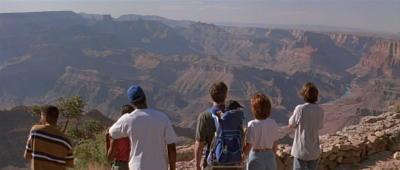Format: DVD from Sycamore Public Library on rockin’ flatscreen.

Grand Canyon earned some immediate cred from when in an early scene, Kevin Kline was driving down a street in Los Angeles singing along to “Lawyers, Guns, and Money.” Another Warren Zevon song (Searching for a Heart) shows up later in the movie. Any movie that’s going to favorably showcase a couple of Warren Zevon songs can’t be all bad. It can be mostly bad, but it can’t be entirely bad.
Grand Canyon wants desperately to be an “issues” movie. What it turns out to be is a lite version of Crash a decade and a half before Crash. The comparison is a completely natural one, and had Grand Canyon been released after Crash, no one would have bought it for a second. We’re going to get a number of disparate people thrown together and we’ll see what happens a little more than two hours later, and all of our characters are going to end up at our title destination at the end.
So let’s go through all of these stories.
• An immigration lawyer named Mack (Kevin Kline) has his car break down in a bad part of Los Angeles one night. While he is accosted by a gang of local black kids, he is suddenly rescued by Simon (Danny Glover), a tow truck driver.
• Mack’s wife Claire (Mary McDonnell) discovers an abandoned baby the next morning while out for a run.
• Violent action movie producer Davis (Steve Martin) is shot in the leg by a mugger who steals his watch.
• Feeling like he needs to repay Simon in some way, Mack sets him up on a date with Jane (Alfre Woodard), someone he barely knows through his assistant, Dee (Mary-Louise Parker).
• Dee evidently had a one night stand with Mack and is now hopelessly in love with him despite him rejecting her constant advances.
• Simon’s sister (Tina Lifford) lives in a bad part of town rife with gang activity. Her son Otis (Patrick Malone) is a gangbanger, and one day a drive-by shoots up their house.
There’s more, but dammit, I think that’s enough. Grand Canyon is going to spend a great deal of time cycling through these stories and giving us some motivation (sometimes) for why the people are acting the way they are. For instance, it’s not hard to figure out that Claire is suddenly desperate to adopt the baby she found because, well, her son Roberto (Jeremy Sisto) is 15 or so and will soon be leaving the nest. Davis, whose movies are ultraviolent, has a sudden change of heart, thinking that he should be campaigning against violence in the movies because of what happened to him. Otis has a run-in with cops after his family moves, which only makes him consider going back to his gang all the more. At least the film is clear on giving us motivations for some of this stuff.
It plays out, though, that the world is loaded with either white people problems or problems that white people can solve. Mack seems to be unable to keep his hands out of Simon’s life, doing everything he can to make Simon’s life better in every way he possibly can because, well, Simon did him a service one scary night and Mack can’t let it go. Simon wasn’t really aware that he had these problems, evidently. It’s up to the white guy to point out to him that they even exist.
Because there are so many stories running through this, most of them get short shrift or simply move too fast. Simon and Jane go out on a date and by the end of the evening, they’re convinced that Mack is, and I’m quoting here, “some kind of genius.” White people solve everything!
Ultimately, and yes I’m getting a little bit into spoiler territory here, but I’m not going to give you all of the resolutions to all of the plots, the whole point of Grand Canyon is to get our characters to the title location. Why? Because the Grand Canyon is vast and took millions of years to form. Because, as Simon suggests at one point early in the film, the lives of individual people are nothing compared with it. We all live out our lives thinking they are so important, and the Grand Canyon puts all of that into perspective. And once we get there, we get a quick shot of our group of people standing on the edge…and roll credits. All that way for a short money shot.
Here’s the thing: you (and these characters) could get the exact same sense of proportion of their own lives and their own problems with a quick drive out into the desert on a cloudless night. A few minutes spent looking at photography from the Hubble would underline that same sense of ultimate insignificance.
The problem with that, of course, is that white people didn’t solve their own insignificance problem. Ultimately, Grand Canyon comes across as a lot preachier than it probably wants to be. It’s not a terrible movie, and it’s beautifully cast—it’s one of those early ‘90s movies with a perfect early ‘90s snapshot cast. But it doesn’t really say a lot even though it wants to, and it takes a really long time to say a small portion of what it thinks it’s saying.
I said at the top that no movie that features a couple of Warren Zevon songs can be all bad. I can say, though, that it’s possible for the Warren Zevon songs to be the best part of the film.
Why to watch Grand Canyon: The most ‘90s cast you can think of.
Why not to watch: It’s Crash-lite, and not always in a good way.
